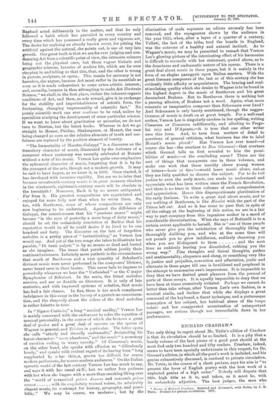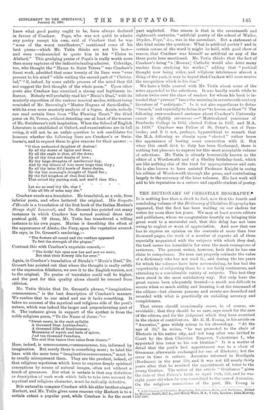knew what good poetry ought to be, have always declared
in favour of Crashaw. Pope, who was not quick to admire any poetry except his own, said of Crashaw that he was "none of the worst versificators," mentioned some of his best pieces—which Mr. Tutin thinks are not his best— and even condescended to quote him in his " Eloisa to Abelard." This grudging praise of Pope's is really worth more than many raptures of the indiscriminating admirer. Coleridge, too, who thought the "Hymn to Saint Teresa" was Crashaw's finest work, admitted that some twenty of its lines were "ever present to his mind" while writing the second part of " Christa- bel," "if, indeed, by some subtle process of the mind they did not suggest the first thought of the whole poem." Upon other poets also Crashaw has exercised a strong and legitimate in- fluence. Nobody will probably read his" Music's Duel," with its masterly exposition of the various musical modes, without being reminded of Mr. Browning's "Master Hugues of Saxe-Gotha," with its even more masterly analysis of a fugue. Again, nobody can read certain lines from "The Flaming Heart," the third poem on St. Teresa, without detecting one at least of the sources of Mr. Swinburne's rich inspiration. When the School of English Literature is established at Oxford, and examinations are in full swing, it will not be an unfair question to ask candidates for honours whether the following lines are Crashaw's or Swin- burne's, and to request them to give reasons for their answer :—
"0 thou undaunted daughter of desires!
By all thy dower of lights and fires ; By all the eagle in thee, all the dove; By all thy lives and deaths of love ; By thy large draughts of intellectual day, And by thy thirsts of love more large than they ; By all thy brim-fill'd bowls of fierce desire, By thy last morning's draught of liquid fire ; By the full kingdom of that final kiss, That seized thy parting soul, and seal'd thee His ;
Let me so read thy life, that I Unto all life of mine may die."
Crashaw excels as a translator. He translated, as a rule, from inferior poets, and eften bettered the original. His Sospetto d'Herode is a translation of the first book of the Italian Marino's &rage degli Innocenti, and Dr. Grosart has pointed out many instances in which Crashaw has turned poetical dross into poetical gold. Of these, Mr. Tulin has transferred a telling
instance to his own pages. Marino is describing the effect of
the appearance of Alecto, the Fury, upon the vegetation around. He says, in Dr. Grosart's rendering,— " The flowers all round and the verdure appeared To feel the strength of the plague."
Contrast this with Crashaw's exquisite conceit,— " The fields' fair eyes saw her and saw no more, But shut their flowery lids for ever."
Again, in Crashaw's translation of Strada's "Music's Due]," Dr. Grosart has pointed out that where the thought is really subtle or the expression felicitous, we owe it to the English version, not to the original. No praise of translator could well be higher, and the poet for this quality alone should be rescued from oblivion.
Mr. Tutin thinks that Dr. Grosart's phrase, "imaginative- sensuousness," is the best description of Crashaw's manner.
We confess that to our mind and ear it lacks something. It takes no account of the mystical and religious side of the poet's nature, which was indeed the larger and preponderating part of it. The instance given in support of the epithet is from the noble religions poem, "To the Name of Jesus :"—
" Sweet name, in thy each syllable
A thousand blest Arabias dwell ; A thousand hills of frankincense;
Mountains of myrrh and beds of spices,
And ten thousand Paradises, The soul that tastes thee takes from thence."
Here, indeed, is sensuousness,—sensuousness, too, informed by imagination. But surely there is something more ; to label the lines with the mere term "imaginative-sensuousness," must be to cruelly misrepresent them. They are the product, indeed, of that religious mysticism which loves to express deeply spiritual conceptions by means of natural images, often not without a touch of grossness. But what is certain is that any definition or description of such work which fails to take into account its mystical and religious character, must be radically defective.
It is natural to compare Crashaw with his elder brother-singer Herbert, and Mr. Tutin gives some reasons why Herbert is to a certain extent a popular poet, while Crashaw is for the most part neglected. One reason is that in the seventeenth and eighteenth centuries, "artificial poetry of the school of Waller, Dryden, Pope," &a., was in the ascendant. But a statement of this kind raises the question : What is artificial poetry P and in certain senses of the word it might be held, with good show of reason, that Crashaw was himself as artificial as any of the three poets here mentioned. Mr. Tutin thinks that the fact of Crashaw's being "a [Roman] Catholic would also deter many readers from studying his works ;" adding that "poetical thought now being wider, and religious intolerance almost a thing of the past, it may be hoped that Crashaw will soon receive the recognition which is his due."
We have a little quarrel with Mr. Train about some of the notes appended to the selections. It was hardly worth while to inform twice over the class of readers for whom his book is in- tended that "prevent" bears the meaning in seventeenth-century literature of "anticipate." Is it not also superfluous to define "broach," and especially to define it as "to loosen, or thaw"? The following over-condensed sentence about Crashaw's University career is slightly erroneous :—" Matriculated pensioner of Pembroke College in 1632, elected Fellow in 1637, and M.A. in 1638." Crashaw was Fellow of St. Peter's, not of Pem- broke; and it is not, perhaps, hypercritical to remark that the M.A. following so closely upon " elected " rather bears the appearance of having some connection with it. But when this small debt to duty has been discharged, there is nothing but pleasure to express for this most acceptable volume of selections. Mr. Train is already honourably known as the editor of a Wordsworth and of a Shelley birthday-book, which are like nothing else of the kind for appropriateness and care. He is also known to have assisted Professor Knight in seeing his edition of Wordsworth through the press, and contributing largely to the accuracy of the later volumes. His last work will add to his reputation as a serious and capable student of poetry.



















































 Previous page
Previous page